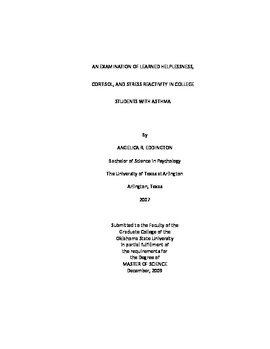| dc.contributor.advisor | Mullins, Larry L. | |
| dc.contributor.author | Eddington, Angelica Radina | |
| dc.date.accessioned | 2014-04-15T22:23:39Z | |
| dc.date.available | 2014-04-15T22:23:39Z | |
| dc.date.issued | 2009-12-01 | |
| dc.identifier.uri | https://hdl.handle.net/11244/9414 | |
| dc.description.abstract | The purpose of the present study was twofold: 1) to examine aspects of a learned helplessness induction task and salivary cortisol in college students with asthma compared to age-and gender-matched controls; and 2) to examine constructs of illness uncertainty and intrusiveness in college students with asthma as predictors of quality of life, anxiety, and depression. Participants were recruited online through a research database and through the university health center. Participants were 30 college students with asthma and 30 age-and gender- matched controls. All participants were randomly assigned to either receive an uncontrollable or controllable task. Cortisol samples were taken three times (T1-baseline, T2-after stressor, and T3-15 minutes post) throughout the course of the task. Matched controls completed the Center for Epidemiologic Studies Depression Scale (CES-D), the Zung Self-Rating Anxiety Scale (SAS) and the SF-36 Health Survey. Participants with asthma completed these previous measures in addition to the Mishel Uncertainty in Illness Scale-Community Form (MUIS-C) and the Illness Intrusiveness Scale (IIS). Results revealed that students with asthma had significantly lower ratings of physical HRQOL than controls. No differences were found with regards to mental HRQOL, depression, or anxiety between the students with asthma and controls. After controlling for significant illness characteristics, illness intrusiveness predicted decreased physical and mental HRQOL and increased depression in students with asthma. Notably, we could not replicate a learned helplessness induction in students with asthma. However, evidence for higher T1 and T2 levels of cortisol in students with asthma compared to T3 levels was supported. Overall, these preliminary results suggest that HRQOL and physiological differences exist between students with asthma and controls. Additionally, illness intrusiveness appears to be an important risk factor among students with asthma. Future research investigating illness constructs and stress reactivity in individuals with asthma is warranted. | |
| dc.format | application/pdf | |
| dc.language | en_US | |
| dc.publisher | Oklahoma State University | |
| dc.rights | Copyright is held by the author who has granted the Oklahoma State University Library the non-exclusive right to share this material in its institutional repository. Contact Digital Library Services at lib-dls@okstate.edu or 405-744-9161 for the permission policy on the use, reproduction or distribution of this material. | |
| dc.title | Examination Of Learned Helplessness, Cortisol, And Stress Reactivity In College Students With Asthma | |
| dc.type | text | |
| dc.contributor.committeeMember | Chaney, John M. | |
| dc.contributor.committeeMember | Page, Melanie C. | |
| osu.filename | Eddington_okstate_0664M_10674.pdf | |
| osu.college | Arts and Sciences | |
| osu.accesstype | Open Access | |
| dc.description.department | Department of Psychology | |
| dc.type.genre | Thesis | |
| dc.subject.keywords | asthma | |
| dc.subject.keywords | college students | |
| dc.subject.keywords | learned helplessness | |
| dc.subject.keywords | stress reactivity | |
